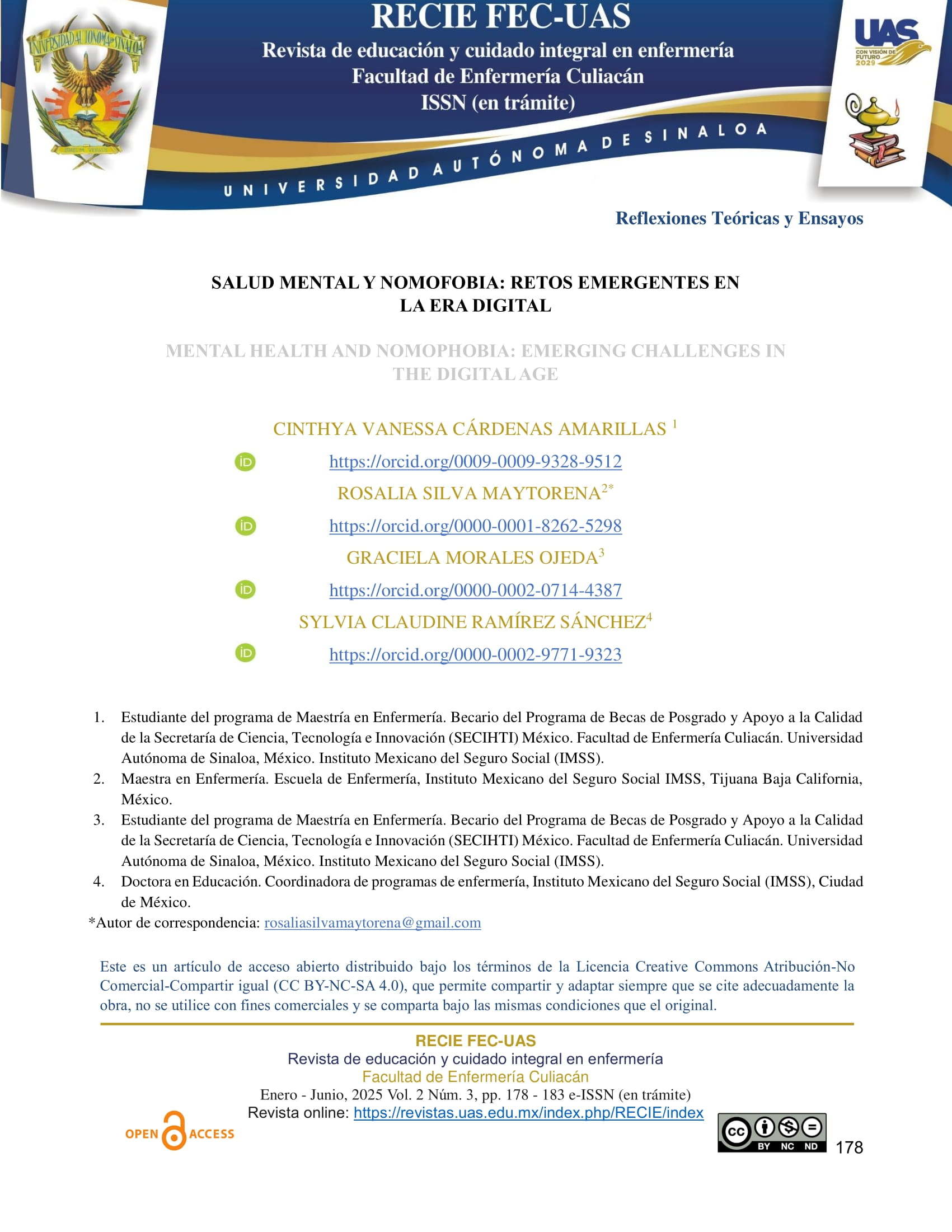Mental health and nomophobia: emerging challenges in the digital age
Keywords:
Mental health, Nomophobia, Technology addiction, Anxiety, BurnoutAbstract
Introduction: Nomophobia, understood as the irrational fear of being without a mobile phone, is an emerging phenomenon that affects mental health. Its presence has been observed in both students and professionals, impacting emotional well-being as well as academic and work performance.Objective: To assess the impact of nomophobia on mental health and explore the relationship between excessive use of mobile devices and the emergence of associated disorders, such as anxiety and burnout.Development: Various studies have linked mobile phone addiction to elevated levels of anxiety, stress, and depressive symptoms. In academic and professional contexts, digital dependency is associated with a decline in self-perception and the onset of burnout, demonstrating a negative impact on quality of life. The COVID-19 pandemic has intensified this issue by increasing the need for digital connectivity and, consequently, the risk of developing nomophobia. The integration of screening tools and psychosocial support programs has been proposed as an effective strategy to mitigate these adverse effects.Conclusions: It is essential to implement preventive interventions and integrated early detection strategies to address nomophobia, which will help improve mental health and quality of life. Promoting digital education and strengthening psychosocial support programs are crucial to counteract the negative effects of excessive mobile phone use.
Downloads
References
Dorantes Carrión, J. J., & Reyes Estudillo, Y. (2021). El uso y dependencia al teléfono celular en estudiantes de licenciatura. IS, 6(11), 31-48. DOI: https://doi.org/10.25009/is.v0i11.2669
Gao, J., Ma, W., & Liu, C. (2023). Fear of missing out and problematic smartphone use among Chinese college students: The roles of positive and negative metacognitions about smartphone use and optimism. PLOS ONE, 18(11). DOI: https://doi.org/10.1371/journal.pone.0294505
Gatelum López, M. M., Tirado Reyes, R. J., Alpizar Cota, E. A., Aguilar Lizárraga, M. E., Díaz Sarabia, A. G., Ortíz Félix, R. E., Valladares Trujillo, R., Zamora Villegas, A. L., & Angulo Trizón, G. del C. (2025). Mobile phone addiction among healthcare professionals in Culiacán, Sinaloa, Mexico. Salud Ciencia y Tecnología, 5, 1112. DOI: https://doi.org/10.56294/saludcyt20251112
Hernández Monterroza, M. L. (2023). Padecimiento de Tecnopatías en estudiantes de Educación Superior de El Salvador. UNICAES, 12(1), 97-112. https://repositoriounicaes.catolica.edu.sv/jspui/bitstream/unicaes/455/1/Padecimientode-tecnopati%CC%81asA7AI23.pdf
Ibarra Fragoso, S., Tirado Reyes, R. J., Domínguez Quevedo, B. M., Castañeda Ayón, K. C., Navarro Rodríguez, D. C., Medina Serrano, J. M., et al. (2024). Nomophobia in Nursing Staff and Interns at a Second Level Medical Care Hospital in Mexico. Salud, Ciencia y Tecnología, 4, 964. DOI: https://doi.org/10.56294/saludcyt2024.964
León-Mejía, A., Calvete, E., Patino-Alonso, C., Machimbarrena, J. M., & González-Cabrera, J. (2021). Cuestionario de Nomofobia (NMP-Q): Estructura factorial y puntos de corte para la versión española. Adicciones, 33(2), 137-148. DOI: https://doi.org/10.20882/adicciones.1316
Morales-Chainé, S. (2021). Impacto de la pandemia por COVID-19 en la salud mental. Enferm Univ, 18(2), 130-133. https://www.scielo.org.mx/scielo.php?script=sci_arttext&pid=S1665-70632021000200001
Organización Mundial de la Salud [OMS]. (2022). Salud mental: fortalecer nuestra respuesta. https://www.who.int/es/news-room/fact-sheets/detail/mental-health-strengthening-our-response
Ramos-Núñez, I., & Gracia-Leiva, M. (2022). Salud Mental en España. https://fundadeps.org/opinion/salud-mental-en-espana-2022/
Tirado Reyes, R. J. (2023). Adicción a los teléfonos móviles y uso de aplicaciones relacionadas a la salud. Paraninfo Digital, (35). https://ciberindex.com/c/pd/e35049d
Tirado Reyes, R. J. (2023). Nomofobia: adicción a los teléfonos celulares. Buelna Órgano de Difusión de la Dirección General de Comunicación Social de la Universidad Autónoma de Sinaloa, 1(537), 20-21. https://dcs.uas.edu.mx/semanario
Tirado-Reyes, R. J., Angulo Trizón, G. del C., Jiménez-Barraza, V. G., Frayre de la O, A. D., Garay-Núñez, J. R., Heredia-Heredia, F., Medina-Inda, L. V., Cota-Valenzuela, G., Buichia-Sombra, F. G., & Aguilar-Lizárraga, M. E. (2025). Association between academic burnout and self-perception in nursing students in northwestern Mexico: A multicentric study. Salud Ciencia y Tecnología, 5, 1129. DOI: https://doi.org/10.56294/saludcyt20251129
Valdez Bernal, E. D., Tirado Reyes, R. J., Garay Núñez, J. R., Dorantes Bernal, K. E., Jiménez Barraza, V. G., Medina Serrano, J. M., Gil Ramírez, A. L., & Beltrán Montenegro, M. del C. (2024). Screening for mental disorders in health workers. Salud Ciencia y Tecnología, 4. DOI: https://doi.org/10.56294/saludcyt2024.909

Downloads
Published
Issue
Section
Categories
License
Copyright (c) 2025 RECIE FEC-UAS Revista de educación y cuidado integral en enfermería Facultad Enfermería Culiacán

This work is licensed under a Creative Commons Attribution-NoDerivatives 4.0 International License.

